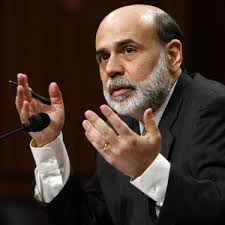What the Government Can and Cannot Do
 For the first time in decades there seems to be a serious discussion about the role of government in a free society and the question of what it "can" and "cannot" do is becoming ever so common. Rep. Michele Bachman (R-MN) had an excellent exchange with the Secretary of Treasury Tim Geithner on this subject.
For the first time in decades there seems to be a serious discussion about the role of government in a free society and the question of what it "can" and "cannot" do is becoming ever so common. Rep. Michele Bachman (R-MN) had an excellent exchange with the Secretary of Treasury Tim Geithner on this subject.The issue being discussed was the Constitutionality of the bailout. Geithner was being questioned by the House Banking Committee. The exchange went something like this:
BACHMAN: By what authority did the Treasury Department bailout major financial institutions?
GEITHNER (clearly looking puzzled by the question): What do you mean?
BACHMAN: What legal authority did you have to do this?
GEITHNER (almost looking guilty and certainly more confused): Congress said we could.
From there the conversation digressed to one very similar that a child with his hand stuck in a cookie jar would say to a parent. "Bobby said I could do it." Of course, Bobby didn't have the authority, but we will blame him anyway. That is the dilemma today. We have years of Constitutional authority that has deteriorated away and a government that largely runs on autopilot. This is beyond government based on "precedent," which means new laws are tested against others that passed court muster. This is filled with enough peril, but the new model is to rapidly pass laws and see if they hold up or not. With so many years of complacency, many things become law that would not have had a prayer a few generations ago.
So the question of what government can and cannot do remains. The answer to me seems simple. You have to read the source, which is the US Constitution. It is a very short read, measured in dozens of pages. The document is also very straight forward:
- What the Government can do is found in a short section of the Constitution often referred to as the enumerated powers (Article I, Section 8). There you will find seventeen things the government can do. Really interesting things like post offices, post roads, and standard weights and measures. Very little of what government does today can be found as a listed power of government.
- Many through out the states that were needed in ratifying this Constitution noted a "necessary and proper clause" in Article I, Section 8 that was designed to make sure these 17 things would be allowed to be fulfilled (noting the problems the government had under the Articles of Confederation before). Because of their concerns about the fact that some could interpret that clause as anything those in government deemed "necessary and proper," they forced the government to add Ten Amendments to the Constitution, also referred to as the Bill of Rights.
- "Amendments", as the name implies is about changing. So these amendments changed any assumptions or potential loopholes in the Constitution in the areas they addressed. When it comes to the issue of government power, the Tenth is the most important of these amendments, stating that "The powers not delegated to the United States by the Constitution, nor prohibited by it to the States, are reserved to the States respectively, or to the people." Simply put, if not an enumerated power, it is for the states or the people. Period. If people want socialized health care, move to states like Oregon or Massachusetts that have such programs or even try to pursue such in their own states. The Founding Fathers were brilliant in understanding that a "one sized fits all" form of government would eliminate competition in policy and have people with no freedom of choice. That, more than anything else, made them believe in state rights.
In spite of the clarity, government has been moving towards the elimination of our freedoms for generations. To move back in that direction will be challenging, but is necessary. What our government is allowed to do according to the law, however, is obvious. To think differently is disingenuous.
Kevin Price is Host of the Price of Business, the longest running show on AM 650 (M-F at 11 am) in Houston, Texas and on AOL Radio. His articles often appear in Chicago Sun Times, Reuters, USA Today, and other national media. Steve Moore of the Wall Street Journal calls Price the “best business talk show host in the country.” Find out why and visit his blog at www.BizPlusBlog.com and his show site at www.PriceofBusiness.com. You can also find Price on Strategy Room at FoxNews.com.
Labels: Bill of Rights, Michele Bachman, restoration, Tenth Amendment, Tim Geithner, Treasury Department, US Constitution
























